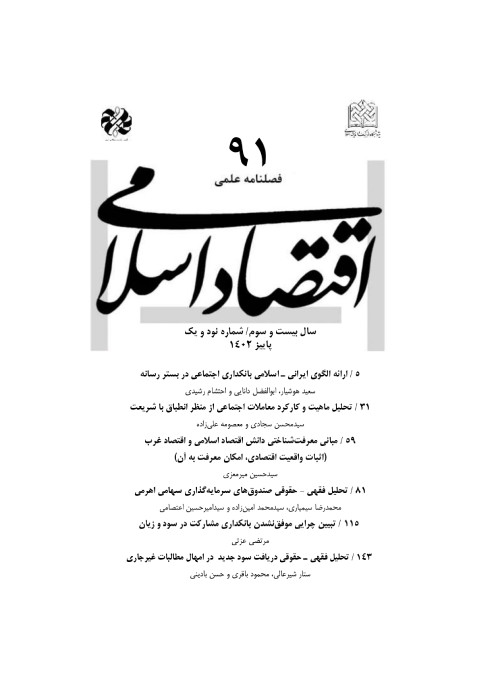A New Model of Banking without Usury
Author(s):
Abstract:
More than 23 years of experience in the execution of the laws concerning banking operations without usury based on the present model indicates that the practice has, of course, had its moments of success, while at the same time it has shown to have its own shortcomings some of which are as follows:Training bank clerks becomes complicated, time-consuming and costly due to the excessive banking contracts.Insufficient training of bank clerks leads to inappropriate choices regarding the drawing up of contracts and also to the clerks’ failing to make the clients understand the nature and conditions of the contracts and this, results in the formality and thus the annulment of many contracts.Some of these contracts do not conform to banking activities, and therefore the correct implementation of such contracts is not possible.Some of these contracts need continuous control and supervision, while not all banks have sufficient tools and human resources for the implementation of such control and supervision.The correct execution of some contracts is coupled with heavy operational costs and is therefore not financially viable for all banks.Some contracts are not appropriated to the clients’ tastes and aims, and as a result. the clients have little inclination in carrying out the procedures of the contracts correctly.For the resolution of such difficulties, another model has been designed which is referred to as “the New Model of Banking without Usury”. The basis of this model includes the clients’ tastes, aims and expectations on the one hand, and the qualitative difference of Islamic contracts on the other.The new banking model divides banks into three groups: commercial banks with a fixed rate of interest based on exchange contracts, specialized banks with a variable rate of interest based on joint contracts, and general public banks with a special composition of exchange and joint contracts. The new model appropriates these divisions in such a way as to answer the expectations of all bank clients according to their aims and tastes, through the drawing up of agreements in accordance with Islam. After having taken a brief look at various models of banking without usury, regarding the supply of equipments and allocation of resources, the article assesses the present model of banking without usury in order to study and clarify its religious and legal foundations.
Language:
Persian
Published:
Islamic Economy, Volume:6 Issue: 23, 2006
Page:
13
magiran.com/p528946
دانلود و مطالعه متن این مقاله با یکی از روشهای زیر امکان پذیر است:
اشتراک شخصی
با عضویت و پرداخت آنلاین حق اشتراک یکساله به مبلغ 1,390,000ريال میتوانید 70 عنوان مطلب دانلود کنید!
اشتراک سازمانی
به کتابخانه دانشگاه یا محل کار خود پیشنهاد کنید تا اشتراک سازمانی این پایگاه را برای دسترسی نامحدود همه کاربران به متن مطالب تهیه نمایند!
توجه!
- حق عضویت دریافتی صرف حمایت از نشریات عضو و نگهداری، تکمیل و توسعه مگیران میشود.
- پرداخت حق اشتراک و دانلود مقالات اجازه بازنشر آن در سایر رسانههای چاپی و دیجیتال را به کاربر نمیدهد.
In order to view content subscription is required
Personal subscription
Subscribe magiran.com for 70 € euros via PayPal and download 70 articles during a year.
Organization subscription
Please contact us to subscribe your university or library for unlimited access!


